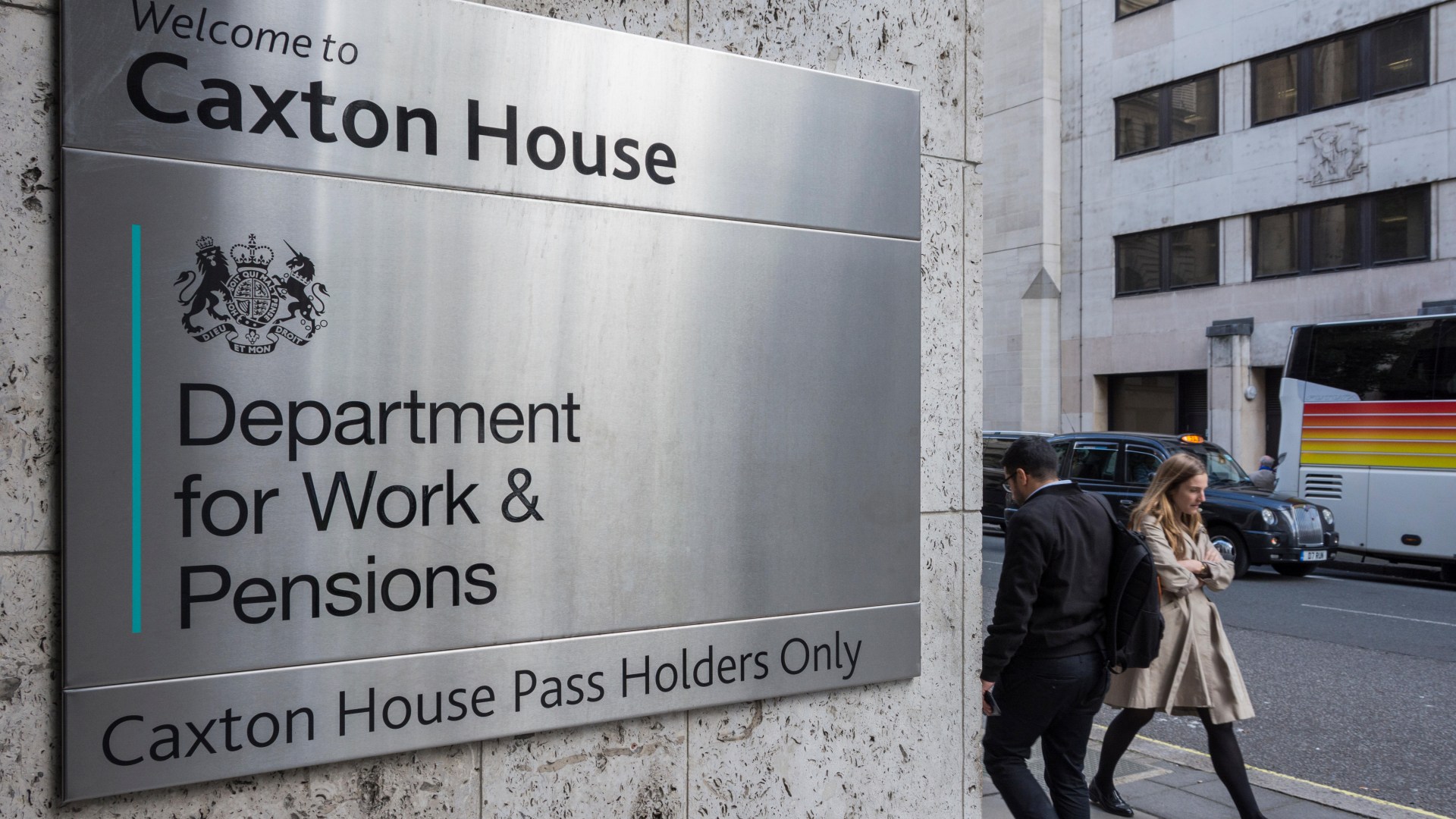Money
Millions on state pension to receive festive bonus

IF you receive a state pension then you’re eligible for a cash gift from the Government this winter.
The annual £10 festive bonus is paid every year to millions of people on benefits and is designed to help with the extra costs of Christmas.
While £10 doesn’t get you far these days, it’s worth having – better in your pocket than theirs after all – and with the increased cost of energy bills since October 1, it all helps.
Plus, the bonus won’t affect your pension credit or any other benefits and it’s tax-free.
Payment is automatic and you should receive the money into your bank account just before Christmas Day.
Introduced in 1972, the festive bonus is still a welcome extra in 2024, with the cost of living being so high.
Who is eligible?
To be eligible this year you have to be in receipt of the state pension during the qualifying week of December 1-8.
You must also live in one of the following countries:
- The UK
- The Channel Islands
- The Isle of Man
- Gibraltar
- Switzerland
- Any European Economic Area (EEA) country
If you don’t claim state pension or have deferred it then you will not receive the cash bonus.
How do I get the Christmas bonus?
If you’re eligible for the £10 bonus then payment is automatic and it goes directly into the same bank account as your pension payments.
It will show up as ‘DWP XB’ on your bank statement so check your statement to make sure you received it.
If you don’t receive a payment but believe you should have done then contact the Pension Service – the address and phone number are on the Government website gov.uk.
Who else can get the bonus?
The £10 cash bonus is currently paid to those on a range of benefits. These are:
- Adult Disability Payment
- Armed Forces Independence Payment
- Attendance Allowance
- Carer’s Allowance
- Child Disability Payment
- Constant Attendance Allowance (paid under Industrial Injuries or War Pensions schemes)
- Contribution-based Employment and Support Allowance (once the main phase of the benefit is entered after the first 13 weeks of claim)
- Disability Living Allowance
- Incapacity Benefit at the long-term rate
- Industrial Death Benefit (for widows or widowers)
- Mobility Supplement
- Pension Credit – the guarantee element
- Personal Independence Payment (PIP)
- Severe Disablement Allowance (transitionally protected)
- Unemployability Supplement or Allowance (paid under Industrial Injuries or War Pensions schemes)
- War Disablement Pension at State Pension age
- War Widow’s Pension
- Widowed Mother’s Allowance
- Widowed Parent’s Allowance
- Widow’s Pension
What other help is available for pensioners this Christmas?
A winter fuel payment, which is worth up to £300, will be paid to some people receiving the state pension this winter, though not all.
The payment is now means-tested so if you receive pension credit you’re eligible for the one-off annual payment, but if you don’t then you will no longer qualify.
If you’re on pension credit and aged 75 or older, you will also be eligible for a free TV licence.
To check your eligibility for pension credit take a look at the Government website.
Pension Credit explained
Pension Credit is a benefit which gives you extra money to help with your living costs if you’re on a low income in retirement.
It can also help with housing costs such as ground rent or service charges.
You may be able to get extra help of you’re a carer, have a disability, or are responsible for a child.
It also opens up access to lots of other benefits such as the warm home discount scheme, support for mortgage interest, council tax discounts, free TV licences once you’re over 75, and help with NHS costs.
To qualify, you need to be over state pension age and live in England, Scotland or Wales.
If you have a partner, you need to include them on your claim.
Pension Credit tops up:
- your weekly income to £218.15 if you’re single
- your joint weekly income to £332.95 if you have a partner
However, even if your income is higher, you might still qualify if you have a disability or caring responsibilities.
There is also another element to Pension Credit called savings credit. To get this, you need to have saved some money towards your retirement.
You can get an extra £17.01 a week for a single person or £19.04 a week for a married couple.
If you have more than £10,000 in savings, the government uses a calculation to work out how much it adds to your income.
Every £500 over £10,000 counts as £1 income a week. For example, if you have £11,000 in savings, this counts as £2 income a week.
Do you have a money problem that needs sorting? Get in touch by emailing money-sm@news.co.uk.
Plus, you can join our Sun Money Chats and Tips Facebook group to share your tips and stories
Money
Weekend Essay: Confronting our biggest fear – public speaking


Do you remember all those awkward job interview questions?
I’m thinking of pearls such as: ‘Where do you see yourself in five years’ time?’ (Not here); ‘Why do you want to work in this industry?’ (I can’t get a job in my preferred field); and ‘Why should we hire you?’ (I desperately need the cash).
But, for me, the most annoying by far is, ‘What’s your greatest weakness?’
Of course, it’s not difficult to answer – I can reel off several weaknesses without breaking a sweat. But it can be hard to think of a weakness that doesn’t undermine your claim to the role. After all, who’s going hire someone who’s lazy, unpunctual and selfish (except maybe Donald Trump)?
However, when grumbling about this loaded question to a friend, she surprised me by coming up with the perfect answer: public speaking.
“It’s something everyone can relate to,” she pointed out. “No one will judge you negatively for it and you can use it as an example of personal growth (i.e. I’ve sought to tackle the fear by volunteering for speaking opportunities, training courses, etc).”
If public speaking was ever a fear when I was younger, it’s one I’ve had to confront in my professional life
You can’t fault the logic, and it got me thinking: have I ever been afraid of public speaking?
As a naturally shy person, the answer must be ‘yes’. I certainly remember being very nervous if I ever had to stand up in front of a class or in school assembly. But if public speaking was ever a fear when I was younger, it’s one I’ve had to confront in my professional life.
As a journalist, I’ve done countless speeches, presentations, panel discussions and onstage interviews. I’ve addressed rooms filled with people hanging on my every word (or at least pretending to). And I’ve had to deal with the terror of clamming up, forgetting my train of thought, making a faux pas – all in front of a packed audience.
Make no mistake, this can be a genuine terror. “Most people fear public speaking more than death,” says Dan Graham of NextGen Planners, whose Speaker & Influencer Programme has trained over 300 finance professionals to overcome this fear since its launch in 2019.
According to Graham, public speaking is a crucial and undervalued skill: “The majority of financial advisers are required to have an influence on their clients every day. By developing their message and their confidence, they can convey important ideas more succinctly.
“From those we have worked with on our programme, the increase in confidence has not only allowed them to deliver their key messages to the world, but also to come out of their shells and let their influence come to the surface.”
The results, claims Graham, have been transformational: “New friendships have been formed, new businesses have been found, client service has improved and those doubting their careers have stayed in the profession.”
By contrast, those who lack the confidence to speak in public miss the opportunity to make these connections. “It means their great ideas are, often, not being heard,” says Graham.
Most people fear public speaking more than death
All of this has been on my mind recently, with the Money Marketing Awards having taken place last month (I did the introductory speech) and MMI London and MMI Leeds coming up soon (I’m opening proceedings and chairing panels at both).
Admittedly, I don’t know how many of my ‘great ideas’ have been shared via public speaking at events such as these. But I do know that speaking in front of people has given me a better sense of myself – how I sound to others, how I communicate and how my personality comes across.
Stated another way, it puts my strengths and weaknesses up in lights for all to see. This can be daunting, but it’s also empowering. Becoming a better public speaker has definitely improved my one-on-one skills, which makes me a better interviewer and networker. It may even have improved my writing (although you, dear reader, can be the judge of that).
And on good days, it plays to the other side of my personality. The truth is, I’m a bit of a show off. As part of my am-dram group, in particular, I love playing to the crowd, making people laugh, feeding off an audience. Those backstage moments can be terrifying, but when it all goes well, it’s the best kind of validation and a huge confidence boost.
So, if public speaking is a step outside the comfort zone for you, don’t be afraid to take that step. In the words of the motivational speaker Rob Brown, “If you can speak, you can influence. If you can influence, you can change lives.”
Money
Major update for nearly 1million energy customers as meters set to go ‘dumb’

MORE than 800,000 households will have their energy meters replaced before the RTS network is switched off next summer.
Economy 7 and other multi-rate energy tariffs use these meters, which charge users different rates depending on the time of day.
These devices are operated through the Radio Teleswitch Service (RTS), which broadcasts a signal alongside the long-wave channel for BBC Radio 4.
This service is being turned off on June 30 2025 after the deadline was extended following coverage by The Sun last year.
The switch-off could lead to huge bill hikes for customers as they are no longer able to access cheaper energy rates.
Some homes, businesses and schools could even be left without heating or hot water.
Others may be unable to turn off their heating.
The only way to avoid facing these issues is for affected households to switch to a smart meter.
Customers who swap to a smart meter will still be able to access multi-rate energy tariffs including Economy 7.
What has been agreed?
Energy suppliers, Government and consumer groups have now pledged to work together to replace RTS meters before the switch off.
The ten energy companies who have signed up are British Gas, EDF, E.On, Octopus, Ovo, Scottish Power, So Energy, SSE, Total Energies, Utilita and Utility Warehouse.
Industry regulator Ofgem, trade association Energy UK, Distribution Network Operators, Smart Energy GB, Government and consumer groups will also be involved.
Through their Call To Action, the industry has pledged to:
- Focus their resources on regional “hot spots” where there are the most RTS customers
- Fast track RTS customers for meter upgrades
- Prioritise upgrades for customers who are known to be vulnerable
- Tackle any technical problems by sharing their knowledge and expertise
- Provide monthly updates on how many meters have been replaced
- Consider if further action is needed
The pledge will also speed up the rate at which RTS meters are replaced.
At the current pace, it would take until 2028 for all of the RTS meters across the UK to be upgraded.
How do I know if I have an RTS meter?
YOU’LL be able to tell if you have a meter that relies on the RTS quite easily.
The oldest RTS-powered meters have a switch box labelled “Radio Teleswitch” located next to the physical electricity meter.
Others may the RTS switch box included within the electricity meter as a single box on the wall.
If you’re unsure about the type of electricity meter in your home – call your supplier as they’ll usually have this information on hand.
What does it mean for me?
Customers who have an RTS meter, or those who are not sure if they have one, should contact their energy supplier for advice.
The supplier should then be able to make an appointment for an engineer to visit their home and check.
Energy companies have been contacting customers about the switch-off since 2023.
But under the new plans suppliers will contact all RTS customers by December 31 2024 to let them know that RTS will be shut down.
Households will also be told why it is important that their service is upgraded and they will be offered an appointment to have their meter upgraded.
It usually takes around two hours for an RTS meter to be upgraded but some cases may need more than one visit by an engineer.
Many properties with RTS meters are in rural areas or on islands.
What are the benefits of installing a smart meter?
Getting a smart meter does not cost anything as your supplier will install it for free.
Customers affected by the RTS switch-off will also not be charged.
Smart meters send readings to your energy supplier automatically, which means you do not need to do this yourself.
They can make your bills more accurate too as they are based on readings from your actual usage, rather than estimates.
The devices can help to track how much energy you use at night, during the day and at peak times.
You will be given an in-home display, which connects to your meter and shows your energy usage and the cost in pounds and pence.
Customers with RTS electricity meters that swap to a smart meter will still be able to access flexible electricity tariffs if they opt for one.
Do you have a money problem that needs sorting? Get in touch by emailing money-sm@news.co.uk.
Plus, you can join our Sun Money Chats and Tips Facebook group to share your tips and stories
Money
Podcast: Confronting our biggest fear – public speaking


In this week’s Weekend Essay, editor Tom Browne dives into one of our biggest fears: public speaking. From awkward job interviews to addressing packed rooms, Tom reflects on his journey from shyness to confidence, and how mastering public speaking can be a game-changer in both personal and professional life. Tune in now:
Money
Tesco recalls Christmas food favourite that may contain pieces of dried GLUE

TESCO has issued an urgent recall urging consumers not to buy certain mince pies because they could contain glue.
The product affected is the six pack of Tesco Finest 6 All Butter Pastry Mince Pies.
Packets with the following best before dates should not be eaten: October 4, October 26, November 2, and November 10.
The Food Standards Agency put the alert up on Thursday warning customers that the baked goods may contain pieces of dried glue from the packaging, making them “unsafe to eat”.
The agency advises customers who have bought the product not to eat it but to return it to any store for a full refund – no receipt is required.
If customers run into any further issues they have been urged to call the Tesco Customer Service line on 0800 50 5555.
The supermarket has reassured customers that no other products have been affected by this issue.
A spokesperson for Tesco said the recall was a “precautionary measure”.
They added:“The quality of our products is our number one priority and we immediately began an investigation with our supplier to understand what happened. We’re sorry for the inconvenience”.
However, if you suspect someone has swallowed glue, the NHS recommends calling 111 for advice.
If the person is showing signs of serious illness, such as loss of consciousness, seizures, or drowsiness, you should call 999 to request an ambulance or take them to the A&E department.
Tesco’s recall follows Marks & Spencer’s announcement yesterday that its butternut squash soup, with a use-by date of 6.10.2024 and barcode 0041142, may contain pieces of metal.
The UK supermarket warned its customers that due to the possible contamination the soup was “unsafe to eat”.
In a similar course of events, Farmfoods, another popular UK supermarket, issued a “do not eat” alert on 20 September over some chicken nuggets.
The frozen food brand said undeclared ingredients could put some at risk of dangerous allergic reactions.
As a general rule, if a recall involves a branded product, the manufacturer would usually have lead responsibility for the recall action.
Your product recall rights
PRODUCT recalls are an important means of protecting consumers from dangerous goods.
But it’s often left up to supermarkets to notify customers when products could put them at risk.
If you are concerned about the safety of a product you own, always check the manufacturer’s website to see if a safety notice has been issued.
When it comes to appliances, rather than just food items, the onus is usually on you – the customer – to register the appliance with the manufacturer as if you don’t there is no way of contacting you to tell you about a fault.
If you become aware that an item you own has been recalled or has any safety noticed issued against it, make sure you follow the instructions given to you by the manufacturer.
They should usually provide you with more information and a contact number on its safety notice.
In some cases, the manufacturer might ask you to return the item for a full refund or arrange for the faulty product to be collected.
You should not be charged for any recall work – such as a repair, replacement or collection of the recalled item.
Product recalls are an important means of protecting consumers from dangerous goods.
Many safety notices are issued as a precautionary measure, letting consumers know an item may be dangerous.
In more serious cases like this one, retailers issue a recall, warning customers not to use the product and asking them to return it.
Usually, if a recall involves a branded product, the manufacturer will be responsible for the recall action.
But it’s often left up to retailers to notify customers when products could put them at risk.
A company will sometimes issue a recall to limit the number of complaints.
Money
Adopting technology could increase costs for clients, AC Wealth CEO warns


Advice firms need to get the balance right between adopting technology and making sure it does not end up costing their clients more, Aberdein Considine Wealth chief executive Jen Paice has warned.
Speaking on a panel at the Lang Cat’s HomeGame 4 event in Edinburgh yesterday (3 October), Paice said firms need to consider the impact on the client.
“At some point, it may end up costing them more, and that’s my concern,” she said.
“We want to deliver better services but also reach more people and, for that, we need technology.
“It’s a fine balance between adopting technology and making sure it doesn’t end up costing the client more.”
She said there is a lot of talk about how technology should reduce costs, but “there’s a concern it might have the opposite effect.”
“For example,” she added, “we are a fixed-fee financial planning firm, so it’s essential for me to be as efficient as possible if I want the business to be more profitable.
“My view on technology is that it should give me more time to think and, ultimately, it’s that thinking time from a chartered financial planner that clients are paying for.”
On the same panel, FNZ group head of UK, Middle East and Africa, Alastair Conway, said technology should remove friction and reduce costs.
“As long as advisers are delivering extra value or cost reductions to clients as a result of using technology, I think it’s fine,” he said.
“In my experience, most advisers have used technology for the benefit of their clients, which is how it should be.”
Ian McKenna: AI advice is a done deal; get used to it
He suggested that, as things evolve, advisers should be able to spend less time on administrative tasks, like filling in forms, and more time on valuable interactions.
“The real value of advisers, from my experience, is the unique ‘magic’ that happens when they sit down with an investor and do what only they can do,” he added.
“While 90% of what advisers do may be broadly the same, it’s the 10% difference that sets them apart and allows great firms to flourish.
“This can be achieved at scale or within smaller firms, and that’s where technology plays a crucial role.”
Money
DWP issues PIP update to help clear huge payment review backlog

CASE workers are being urgently recruited to help clear a huge backlog of Personal Independent Payment (PIP) reviews, the Department for Work and Pensions (DWP) has said.
The backlog of reviews means tens of thousands of individuals may be receiving lower benefit payments than they are entitled to.
PIP is a benefit for people who are under State Pension age and need day-to-day help because of a long-term illness or disability.
It is claimed by 3.5million people and requires reviews to be carried out frequently.
The maximum amount that can be awarded is £184.30 a week, which is based on two assessments – living and mobility.
As of May 31, 2024, there were 392,000 outstanding PIP award reviews in England and Wales, with the DWP citing an unprecedented surge in new claims as the primary cause.
As 73% of planned award reviews result in an increase or no change to the level of award received by claimants, many are missing out as a result of the delays.
In August 2023 Citizens Advice said some people were waiting over two years for a review.
Last month Benefit and Work reported that 120,000 reviews had been registered in the quarter to July 2024, compared to 100,000 cleared, suggesting the backlog is likely to have increased.
Benefits and Work claimed it would take almost a decade to work through the reward backlog at the current rate and estimated more than 74,000 claimants were receiving less than they were entitled to, while awaiting their review.
Sir Stephen Timms, the DWP’s Minister for Social Security and Disability, has said more case workers are being hired to tackle the backlog.
He said: “We continue to prioritise new claims to PIP to ensure claims are put into payment as quickly as possible. Unfortunately, this means many customers are waiting longer than expected for their review to be undertaken.
“We have been actively recruiting additional case managers to meet increased demand for PIP, which means we are now in a position to begin to deploy additional resource onto award reviews. This will increase the number of review cases we can complete ‘in house’.”
While Timms said recruitment was underway he explained that improvements may not be seen immediately as there is an “extensive training period” for case workers.
The number of full time case managers in August 2023 was 1,847, this had increased by 5.5% to 1,948 in August 2024, with further recruitment planned.
Labour has said that most case assessments will now be completed by telephone to increase efficiency.
Those on the highest levels of support will also now receive an ongoing PIP award which is only subject to a light touch review every 10 years.
A DWP Spokesperson said: “Championing the rights of disabled people, so that their views and voices are heard, is at the heart of this government, and we are committed to ensuring disabled people and people with health conditions can access financial support through PIP in a timely manner.”
The maximum PIP award is £184.30 a week, which works out at £9,584 a year.
To qualify for the allowance you must have found it hard to do everyday tasks, because of a mental or physical condition.
You must have experienced this for at least three months and expect it to be hard for another nine months.
According to the latest figures it takes around 15 weeks from the start of your application for a decision to be made about whether you qualify or not.
How do I apply for PIP?
You can make a new Personal Independence Payment (PIP) claim by calling the Department for Work and Pensions (DWP) on 0800 917 2222.
This is the Government department tasked with paying out benefits to millions every year.
There are also other ways to claim if you find it difficult to use a telephone. See Gov.UK for more information.
When you claim, you’ll need:
- Your contact details
- Date of birth
- National Insurance number
- Bank or building society account number and sort code
- Your doctor or health worker’s name, address and telephone number
- Dates and addresses for any time you’ve spent abroad, in a care home or hospital
Someone else can call on your behalf, but you’ll need to be with them when they call.
You’ll then be sent a form to fill in, after which you’ll be invited for an assessment or your health or social care worker will be asked for information.
After this, you’ll be sent a letter telling you if your claim has been successful.
You can read Citizens Advice’s help on preparing for an assessment.
How do I appeal or overturn a decision on PIP?
If your application for PIP has been turned down or you don’t think you’ve been offered enough cash you can appeal the decision.
You first need to ask for a “mandatory reconsideration notice” – this is where the DWP looks at the decision again.
If you are still unhappy with this outcome, you can then appeal to an independent tribunal.
You must send your appeal form in within one month of the date shown on the mandatory reconsideration notice.
Be warned that it usually takes up to six months for an appeal to be heard by the tribunal.
If you’re unhappy with the decision you get from the tribunal, you may be able to get the decision cancelled – known as “set aside”. You’ll be told how to do this at the time.
You may also be able to appeal to the Upper Tribunal (Administrative Appeals Chamber) if you think the tribunal wasn’t able to give you proper reasons for its decision, or back up the decision with facts, or if it failed to apply the law properly.
Are you missing out on benefits?
YOU can use a benefits calculator to help check that you are not missing out on money you are entitled to
Charity Turn2Us’ benefits calculator works out what you could get.
Entitledto’s free calculator determines whether you qualify for various benefits, tax credit and Universal Credit.
MoneySavingExpert.com and charity StepChange both have benefits tools powered by Entitledto’s data.
You can use Policy in Practice’s calculator to determine which benefits you could receive and how much cash you’ll have left over each month after paying for housing costs.
Your exact entitlement will only be clear when you make a claim, but calculators can indicate what you might be eligible for.
Do you have a money problem that needs sorting? Get in touch by emailing money-sm@news.co.uk.
Plus, you can join our Sun Money Chats and Tips Facebook group to share your tips and stories
-

 Womens Workouts2 weeks ago
Womens Workouts2 weeks ago3 Day Full Body Women’s Dumbbell Only Workout
-

 Science & Environment2 weeks ago
Science & Environment2 weeks agoHow to unsnarl a tangle of threads, according to physics
-

 Science & Environment2 weeks ago
Science & Environment2 weeks agoHyperelastic gel is one of the stretchiest materials known to science
-

 Technology2 weeks ago
Technology2 weeks agoWould-be reality TV contestants ‘not looking real’
-

 Science & Environment2 weeks ago
Science & Environment2 weeks agoMaxwell’s demon charges quantum batteries inside of a quantum computer
-

 Science & Environment2 weeks ago
Science & Environment2 weeks ago‘Running of the bulls’ festival crowds move like charged particles
-

 News2 weeks ago
News2 weeks agoOur millionaire neighbour blocks us from using public footpath & screams at us in street.. it’s like living in a WARZONE – WordupNews
-

 Science & Environment2 weeks ago
Science & Environment2 weeks agoHow to wrap your mind around the real multiverse
-

 Science & Environment2 weeks ago
Science & Environment2 weeks agoSunlight-trapping device can generate temperatures over 1000°C
-

 Science & Environment2 weeks ago
Science & Environment2 weeks agoITER: Is the world’s biggest fusion experiment dead after new delay to 2035?
-

 Science & Environment2 weeks ago
Science & Environment2 weeks agoLiquid crystals could improve quantum communication devices
-

 Science & Environment2 weeks ago
Science & Environment2 weeks agoQuantum ‘supersolid’ matter stirred using magnets
-

 Science & Environment2 weeks ago
Science & Environment2 weeks agoPhysicists are grappling with their own reproducibility crisis
-

 Science & Environment2 weeks ago
Science & Environment2 weeks agoQuantum forces used to automatically assemble tiny device
-

 News2 weeks ago
News2 weeks agoYou’re a Hypocrite, And So Am I
-
News3 weeks ago
the pick of new debut fiction
-

 Science & Environment2 weeks ago
Science & Environment2 weeks agoWhy this is a golden age for life to thrive across the universe
-

 Sport2 weeks ago
Sport2 weeks agoJoshua vs Dubois: Chris Eubank Jr says ‘AJ’ could beat Tyson Fury and any other heavyweight in the world
-

 Science & Environment2 weeks ago
Science & Environment2 weeks agoCaroline Ellison aims to duck prison sentence for role in FTX collapse
-

 Science & Environment2 weeks ago
Science & Environment2 weeks agoNuclear fusion experiment overcomes two key operating hurdles
-

 Science & Environment2 weeks ago
Science & Environment2 weeks agoTime travel sci-fi novel is a rip-roaringly good thought experiment
-

 Technology6 days ago
Technology6 days ago‘From a toaster to a server’: UK startup promises 5x ‘speed up without changing a line of code’ as it plans to take on Nvidia, AMD in the generative AI battlefield
-

 Science & Environment2 weeks ago
Science & Environment2 weeks agoLaser helps turn an electron into a coil of mass and charge
-

 Science & Environment2 weeks ago
Science & Environment2 weeks agoNerve fibres in the brain could generate quantum entanglement
-

 MMA6 days ago
MMA6 days agoConor McGregor challenges ‘woeful’ Belal Muhammad, tells Ilia Topuria it’s ‘on sight’
-

 Football6 days ago
Football6 days agoFootball Focus: Martin Keown on Liverpool’s Alisson Becker
-

 News2 weeks ago
News2 weeks agoIsrael strikes Lebanese targets as Hizbollah chief warns of ‘red lines’ crossed
-

 Science & Environment2 weeks ago
Science & Environment2 weeks agoUK spurns European invitation to join ITER nuclear fusion project
-

 CryptoCurrency2 weeks ago
CryptoCurrency2 weeks agoCardano founder to meet Argentina president Javier Milei
-

 Science & Environment2 weeks ago
Science & Environment2 weeks agoMeet the world's first female male model | 7.30
-
Business6 days ago
Eurosceptic Andrej Babiš eyes return to power in Czech Republic
-

 News2 weeks ago
News2 weeks ago▶️ Media Bias: How They Spin Attack on Hezbollah and Ignore the Reality
-
Business2 weeks ago
JPMorgan in talks to take over Apple credit card from Goldman Sachs
-

 Science & Environment2 weeks ago
Science & Environment2 weeks agoFuture of fusion: How the UK’s JET reactor paved the way for ITER
-

 Womens Workouts2 weeks ago
Womens Workouts2 weeks agoBest Exercises if You Want to Build a Great Physique
-

 News2 weeks ago
News2 weeks agoWhy Is Everyone Excited About These Smart Insoles?
-

 Technology1 week ago
Technology1 week agoRobo-tuna reveals how foldable fins help the speedy fish manoeuvre
-

 CryptoCurrency2 weeks ago
CryptoCurrency2 weeks agoEthereum is a 'contrarian bet' into 2025, says Bitwise exec
-

 Science & Environment2 weeks ago
Science & Environment2 weeks agoA new kind of experiment at the Large Hadron Collider could unravel quantum reality
-

 Health & fitness2 weeks ago
Health & fitness2 weeks agoThe secret to a six pack – and how to keep your washboard abs in 2022
-

 Science & Environment2 weeks ago
Science & Environment2 weeks agoA slight curve helps rocks make the biggest splash
-

 Science & Environment2 weeks ago
Science & Environment2 weeks agoQuantum time travel: The experiment to ‘send a particle into the past’
-

 News3 weeks ago
News3 weeks ago▶️ Hamas in the West Bank: Rising Support and Deadly Attacks You Might Not Know About
-

 Science & Environment2 weeks ago
Science & Environment2 weeks agoWhy we need to invoke philosophy to judge bizarre concepts in science
-

 CryptoCurrency2 weeks ago
CryptoCurrency2 weeks agoBitcoin miners steamrolled after electricity thefts, exchange ‘closure’ scam: Asia Express
-

 CryptoCurrency2 weeks ago
CryptoCurrency2 weeks agoDorsey’s ‘marketplace of algorithms’ could fix social media… so why hasn’t it?
-

 CryptoCurrency2 weeks ago
CryptoCurrency2 weeks agoDZ Bank partners with Boerse Stuttgart for crypto trading
-

 CryptoCurrency2 weeks ago
CryptoCurrency2 weeks agoLow users, sex predators kill Korean metaverses, 3AC sues Terra: Asia Express
-

 CryptoCurrency2 weeks ago
CryptoCurrency2 weeks agoBitcoin bulls target $64K BTC price hurdle as US stocks eye new record
-

 Womens Workouts2 weeks ago
Womens Workouts2 weeks agoEverything a Beginner Needs to Know About Squatting
-

 News2 weeks ago
News2 weeks agoFour dead & 18 injured in horror mass shooting with victims ‘caught in crossfire’ as cops hunt multiple gunmen
-

 Womens Workouts2 weeks ago
Womens Workouts2 weeks ago3 Day Full Body Toning Workout for Women
-

 Travel1 week ago
Travel1 week agoDelta signs codeshare agreement with SAS
-

 Servers computers1 week ago
Servers computers1 week agoWhat are the benefits of Blade servers compared to rack servers?
-

 Science & Environment1 week ago
Science & Environment1 week agoX-rays reveal half-billion-year-old insect ancestor
-

 Politics1 week ago
Politics1 week agoHope, finally? Keir Starmer’s first conference in power – podcast | News
-
Business6 days ago
Should London’s tax exiles head for Spain, Italy . . . or Wales?
-

 Technology6 days ago
Technology6 days agoThe best robot vacuum cleaners of 2024
-

 Sport2 weeks ago
Sport2 weeks agoUFC Edmonton fight card revealed, including Brandon Moreno vs. Amir Albazi headliner
-

 Technology2 weeks ago
Technology2 weeks agoiPhone 15 Pro Max Camera Review: Depth and Reach
-

 Science & Environment2 weeks ago
Science & Environment2 weeks agoRethinking space and time could let us do away with dark matter
-

 News2 weeks ago
News2 weeks agoBrian Tyree Henry on voicing young Megatron, his love for villain roles
-

 Health & fitness2 weeks ago
Health & fitness2 weeks agoThe maps that could hold the secret to curing cancer
-

 Science & Environment2 weeks ago
Science & Environment2 weeks agoBeing in two places at once could make a quantum battery charge faster
-

 CryptoCurrency2 weeks ago
CryptoCurrency2 weeks agoRedStone integrates first oracle price feeds on TON blockchain
-

 CryptoCurrency2 weeks ago
CryptoCurrency2 weeks agoBlockdaemon mulls 2026 IPO: Report
-

 CryptoCurrency2 weeks ago
CryptoCurrency2 weeks agoCoinbase’s cbBTC surges to third-largest wrapped BTC token in just one week
-
Politics2 weeks ago
UK consumer confidence falls sharply amid fears of ‘painful’ budget | Economics
-

 Science & Environment2 weeks ago
Science & Environment2 weeks agoCNN TÜRK – 🔴 Canlı Yayın ᴴᴰ – Canlı TV izle
-

 News1 week ago
News1 week agoUS Newspapers Diluting Democratic Discourse with Political Bias
-

 Science & Environment2 weeks ago
Science & Environment2 weeks agoHow one theory ties together everything we know about the universe
-

 CryptoCurrency2 weeks ago
CryptoCurrency2 weeks agoCrypto scammers orchestrate massive hack on X but barely made $8K
-

 Science & Environment2 weeks ago
Science & Environment2 weeks agoTiny magnet could help measure gravity on the quantum scale
-

 Science & Environment2 weeks ago
Science & Environment2 weeks agoHow do you recycle a nuclear fusion reactor? We’re about to find out
-

 CryptoCurrency2 weeks ago
CryptoCurrency2 weeks agoTelegram bot Banana Gun’s users drained of over $1.9M
-

 CryptoCurrency2 weeks ago
CryptoCurrency2 weeks agoVonMises bought 60 CryptoPunks in a month before the price spiked: NFT Collector
-

 CryptoCurrency2 weeks ago
CryptoCurrency2 weeks agoSEC asks court for four months to produce documents for Coinbase
-

 CryptoCurrency2 weeks ago
CryptoCurrency2 weeks ago‘Silly’ to shade Ethereum, the ‘Microsoft of blockchains’ — Bitwise exec
-

 CryptoCurrency2 weeks ago
CryptoCurrency2 weeks ago‘No matter how bad it gets, there’s a lot going on with NFTs’: 24 Hours of Art, NFT Creator
-
Business2 weeks ago
How Labour donor’s largesse tarnished government’s squeaky clean image
-
Politics2 weeks ago
‘Appalling’ rows over Sue Gray must stop, senior ministers say | Sue Gray
-

 News2 weeks ago
News2 weeks agoBrian Tyree Henry on voicing young Megatron, his love for villain roles
-

 Womens Workouts2 weeks ago
Womens Workouts2 weeks agoHow Heat Affects Your Body During Exercise
-

 Womens Workouts2 weeks ago
Womens Workouts2 weeks agoKeep Your Goals on Track This Season
-

 TV2 weeks ago
TV2 weeks agoCNN TÜRK – 🔴 Canlı Yayın ᴴᴰ – Canlı TV izle
-

 News2 weeks ago
News2 weeks agoChurch same-sex split affecting bishop appointments
-

 Politics2 weeks ago
Politics2 weeks agoTrump says he will meet with Indian Prime Minister Narendra Modi next week
-

 Technology2 weeks ago
Technology2 weeks agoFivetran targets data security by adding Hybrid Deployment
-

 Science & Environment2 weeks ago
Science & Environment2 weeks agoSingle atoms captured morphing into quantum waves in startling image
-

 Politics2 weeks ago
Politics2 weeks agoLabour MP urges UK government to nationalise Grangemouth refinery
-

 CryptoCurrency2 weeks ago
CryptoCurrency2 weeks agoLouisiana takes first crypto payment over Bitcoin Lightning
-

 CryptoCurrency2 weeks ago
CryptoCurrency2 weeks ago$12.1M fraud suspect with ‘new face’ arrested, crypto scam boiler rooms busted: Asia Express
-

 Science & Environment2 weeks ago
Science & Environment2 weeks agoA tale of two mysteries: ghostly neutrinos and the proton decay puzzle
-

 CryptoCurrency2 weeks ago
CryptoCurrency2 weeks agoDecentraland X account hacked, phishing scam targets MANA airdrop
-

 CryptoCurrency2 weeks ago
CryptoCurrency2 weeks agoBitcoin price hits $62.6K as Fed 'crisis' move sparks US stocks warning
-

 CryptoCurrency2 weeks ago
CryptoCurrency2 weeks agoCertiK Ventures discloses $45M investment plan to boost Web3
-

 CryptoCurrency2 weeks ago
CryptoCurrency2 weeks agoBeat crypto airdrop bots, Illuvium’s new features coming, PGA Tour Rise: Web3 Gamer
-

 CryptoCurrency2 weeks ago
CryptoCurrency2 weeks agoVitalik tells Ethereum L2s ‘Stage 1 or GTFO’ — Who makes the cut?
-

 CryptoCurrency2 weeks ago
CryptoCurrency2 weeks agoEthereum falls to new 42-month low vs. Bitcoin — Bottom or more pain ahead?
-
Business2 weeks ago
Thames Water seeks extension on debt terms to avoid renationalisation







You must be logged in to post a comment Login